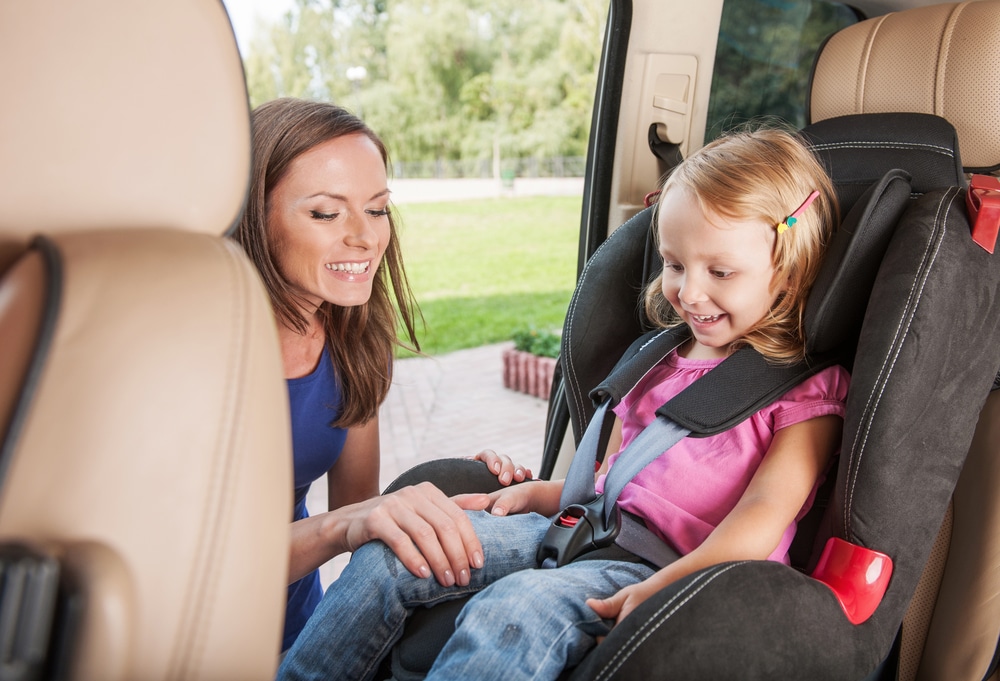Car seat laws vary from state to state in the US, but the car seat laws MA uses offer helpful guidance for parents and caregivers while also employing data-based recommendations to keep kids safe during collisions. Read on to learn more about car seat types, Massachusetts car seat laws, and related information like exemptions and penalties.
Massachusetts Laws and Other Car Seat Basics

Before we review the Massachusetts child seat laws, let’s go over the basic types of car seats commonly sold today and how each one differs from the others on the list.
Car Seat Types
Here are the primary car seat types typically sold to parents and caregivers:
- Front-facing Car Seats
- Rear-facing Car Seats
- Infant Car Seats
- Convertible Car Seats
- Boosters or booster seats
When it comes to safety, rear-facing car seats are your best option as they provide unparalleled protection to the head, neck, and spine during a collision. Your child should be in a rear-facing seat until they are at least one, but preferably two years old or until they outgrow the seat’s height and weight limitations.
Forward-facing seats are another option you have once your child is older than one, and it’s possible for a rear-facing seat to face forward as long as your child still fits the height and weight limits. Forward-facing seats are slightly less safe during a collision, and they should always have a five-point harness.
Once your child has outgrown a rear-facing or forward-facing seat, you’ll need to move on to a booster seat. The booster seat laws MA has are more specific than in some other states but easy enough for caregivers and parents to follow.
Convertible car seats offer parents the option to have their children face the vehicle’s front or rear, and the removable inserts keep kids safe as they grow. These seats also come with five-point harnesses and multiple adjustment points, so they have a more comprehensive range of acceptable height and weight limits.
Infant car seats feature unique designs intended for very young babies, and these seats often have more narrow height and weight limitations, which means your child will outgrow them sooner. Convertible car seats and other rear-facing seats are suitable for infants that fit within the height and weight ranges specific to that product.
Applicable Laws
Unlike in other states, Massachusetts has several car seat laws to ensure minors’ safety, and the requirements are clear and concise, with specific ages and weight limits listed.
It’s required for all children that the car seat gets correctly installed per the manufacturer’s instructions, and the child is fastened in place appropriately.
Here are some other specifics about the car seat laws MA has in place:
- Massachusetts child seat laws dictate that a child must be in an approved restraint device until they are eight years old or measure over 57 inches tall.
- Massachusetts car seat law specifies that a child who is older than five and weighs more than 40 pounds must use a booster seat until they reach eight years old or 57 inches tall.
- A safety belt is required at all times for minors over the age of eight and all adults in a moving vehicle.
- Infant car seats or convertible car seats are required from birth to at least twelve months old.
These laws generally work for most children who grow at an average rate. However, it’s essential to keep in mind that kids develop at different rates, so attention to your child’s age, weight, and height are necessary to maximize their safety.
If your child has a disability and cannot correctly use a car seat, it’s best to determine if your child is exempt from the car seat law and the current process for legally securing that exemption.
If your child is old enough or tall enough to use only a seat belt, the law states that the lap belt must cross snugly over the upper thighs and not rest on the stomach. The shoulder belt also needs to naturally rest across the chest and shoulder without moving over the neck or face.
Official Law vs. Recommendations
Massachusetts law requires complying with federal guidelines or regulations that trump state-level law. The current recommendation is that your child is rear-facing until at least age two, but preferably age three or whenever they outgrow the seat.
Official recommendations strongly encourage keeping your child in a rear-facing seat as long as possible, but under MA law, you can use a forward-facing seat once your child is older than twelve months.
The NHTSA has stricter guidelines than the car seat laws MA has in place for specific age groups, which features a design to maximize the safety a car seat provides to your child. One of their recommendations is to keep your child in the back seat of the vehicle until they are at least twelve years old, but this is not a law.
Exemptions
There are a few exemptions to Massachusetts car seat law, including vehicles manufactured before July 1, 1966. Taxi cabs and children riding in a school bus are also exempt, but there are very few exemptions for children riding in modern vehicles.
If a child cannot sit correctly in a car seat or other child restraint system, they are not required to do so as long as you have the proper documentation. A parent, legal guardian, or caregiver must carry medical documentation confirming a disability that makes the child unable to sit in a car seat correctly.
Violations and Penalties
If you violate Massachusetts car seat law and the related seat belt law requirements, there is a $25 penalty for each violation.
Car Seat Safety and Resources
It’s important to note that car seats do have an expiration date, and you should check the information from the manufacturer that came with the seat or look for the sticker on the car seat itself.
Many parents and caregivers inadvertently install the car seat incorrectly, which can pose a safety risk to your child. It’s worth getting your car seat checked by a trained inspection site, which usually only takes a few minutes.
If you want to use a previously used car seat, make sure it has never participated in a moderate or severe crash and that the expiration date hasn’t already passed. You may also want to check the manufacturer and model number to ensure there haven’t been any recalls.
It’s usually possible to download an instruction book online from the manufacturer site for any car seat. This booklet provides useful information about how the seat operates, where your child’s adjustment points are adequately protected as they grow, and other vital information such as proper installation.
Conclusion
The car seat laws MA has in place follow the federal guidelines currently set for children traveling in a motor vehicle and include proper restraints and car seats appropriate for your child’s age and size.
Massachusetts also offers events where you can check to make sure your car seat gets installed correctly, and rear-facing seats are encouraged for children until age two or three but not required by law.
The law requires that all children have proper restraints in a moving vehicle with few exemptions for school buses, taxis, older cars, and medical exemptions. There is also a specific booster seat law to protect children under the age of eight who are too small to use a safety belt adequately, but few other laws specific to particular car seat types.






